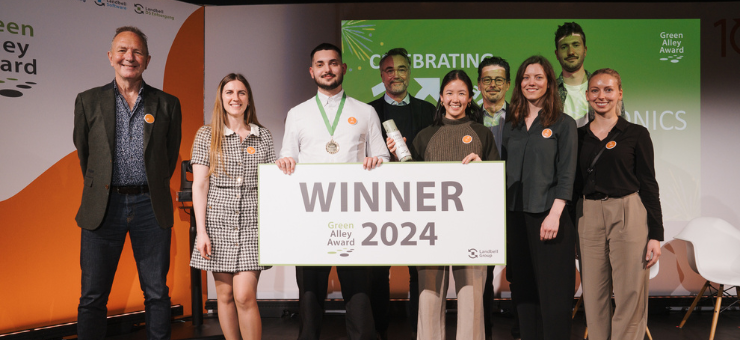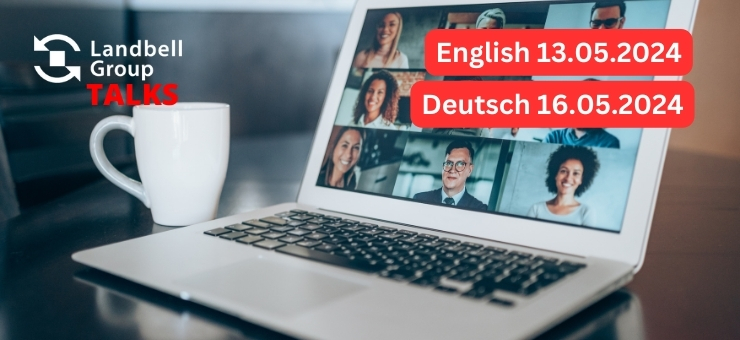29. February 2024
Share this
Landbell Group and CARBIOS join forces to increase circularity of PET waste at first biorecycling plant
- Landbell Group and CARBIOS sign agreement to develop and implement solutions
for the sorting, preparation and enzymatic recycling of post-consumer PET waste
• Landbell Group and CARBIOS combine expertise and innovation to significantly
increase PET recycling from packaging and textile waste
• This partnership contributes 15kt/year of PET flakes to CARBIOS’ sourcing roadmap
for its first commercial plant, 70% of which has been sourced
• This collaboration demonstrates Landbell Group’s commitment towards building
closed-loop solutions for plastic waste through innovative recycling technologies
Mainz, 29 February 2024. Landbell Group, a global operator of more than 40 producer
responsibility organizations (PROs) and a leading provider of closed-loop recycling solutions,
and CARBIOS (Euronext Growth Paris: ALCRB), a pioneer in the development and
industrialization of biological technologies to reinvent the life cycle of plastic and textiles, ,
announce the signing of a non-binding Memorandum of Understanding for the sourcing,
preparation and recycling of post-consumer PET waste using CARBIOS’ biorecycling
technology at its first commercial plant in Longlaville from 2026.
The partnership will leverage Landbell Group’s expertise and network in the sourcing of PET
packaging and textile waste which will be prepared for biorecycling. Thanks to CARBIOS’
highly selective enzyme, less sorting and washing is required compared to current recycling
technologies, offering future savings in energy and water use. From 2026, Landbell Group
will supply CARBIOS with 15 kt/year of PET flakes, ensuring a steady supply chain for
sustainable PET production. These flakes will serve as essential feedstock for CARBIOS’
production of food-grade PTA and MEG, further re-polymerized into PET.
Through the partnership with Landbell Group in Germany, the supply of multilayer trays
through the CITEO tender in France and the MoU with Indorama Ventures, CARBIOS will
have sourced over 70% of its feedstock required for the 50kt/year capacity when its first
commercial plant in Longlaville, France, will operate at full capacity. Close to the borders
with Belgium, Germany and Luxembourg, the plant’s location is strategic for nearby waste
supplies.
Through this partnership with CARBIOS, Landbell Group will ensure that the problematic PET fractions such as multilayered, colored and opaque trays from packaging waste and
polyester textile waste are redirected towards recycling. In this way, Landbell Group
strengthens its commitment to the development of innovative recycling solutions to enable
a circular economy.
Emmanuel Ladent, CEO of CARBIOS: “Through our new partnership with Landbell Group,
CARBIOS secures a significant feedstock supply for our first commercial plant, and we are
pleased to make biorecycled PET available to Landbell’s extensive client portfolio, powering a
circular economy for plastic. CARBIOS’ innovative biorecycling technology enables the
conversion of diverse wastes into valuable products, enhancing flexibility and
competitiveness. By minimizing bottle usage and diversifying raw material sources, we’re
advancing sustainability while meeting market demands effectively. Together, we’re forging
a future where waste becomes a valuable resource.”
Uwe Echteler, COO of Landbell Group: “PET trays are extensively used in food packaging due
to their excellent barrier properties, transparency and strength. However, PET trays,
especially with a multi-layered structure, currently pose a challenge for mechanical recycling.
The innovative depolymerization process developed by CARBIOS facilitates the recycling of
PET waste into high-quality recycled PET. Landbell Group and CARBIOS together will enable
closed-loop recycling of problematic PET waste to allow its customers – packaging
manufacturers and brands – to use recycled content in food packaging and meet their
sustainability targets.”
The environmental benefits of CARBIOS’ biorecycling technology
Recent life-cycle analyses1 show a 57% reduction in CO2 emissions compared with the
production of virgin plastic2, and for every ton of recycled PET produced, 1.3 tons of oil are
avoided. Compared with conventional recycling, enzymatic recycling is 5 times more circular
(calculated according to the Ellen MacArthur Foundation’s Material Circularity Indicator3).
Thanks to its highly selective enzyme, optimized for efficient PET degradation, CARBIOS’
depolymerization process can process all types of PET waste, including colored, multilayer or
textile waste that cannot be recycled using current technologies. Furthermore, the two
monomers produced (PTA and MEG) make it possible to recreate recycled PET products of
identical quality to petro-sourced ones, and suitable for food contact.
[1] Datenbank ecoinvent 3.8
[2]French scenario, taking into account the detour of 50% of PET waste from conventional end-of-life. Virgin PET: 2.53 kg CO2/kg (cradle to gate)
[3]The Material Circularity Indicator (MCI) is a methodology developed by the Ellen MacArthur Foundation to measure how restorative the
material flows are. The MCI gives a value between 0 and 1 where higher values indicate a higher circularity. The MCI value for CARBIOS’
enzymatic recycling is 0.8
Contact:
Dr. Raffaela David
Head of Marketing & PR
E-Mail: r.david@landbellgroup.com
Phone: +49 152 56 405 723
May you also interested
Landbell News
May 6th, 2024


